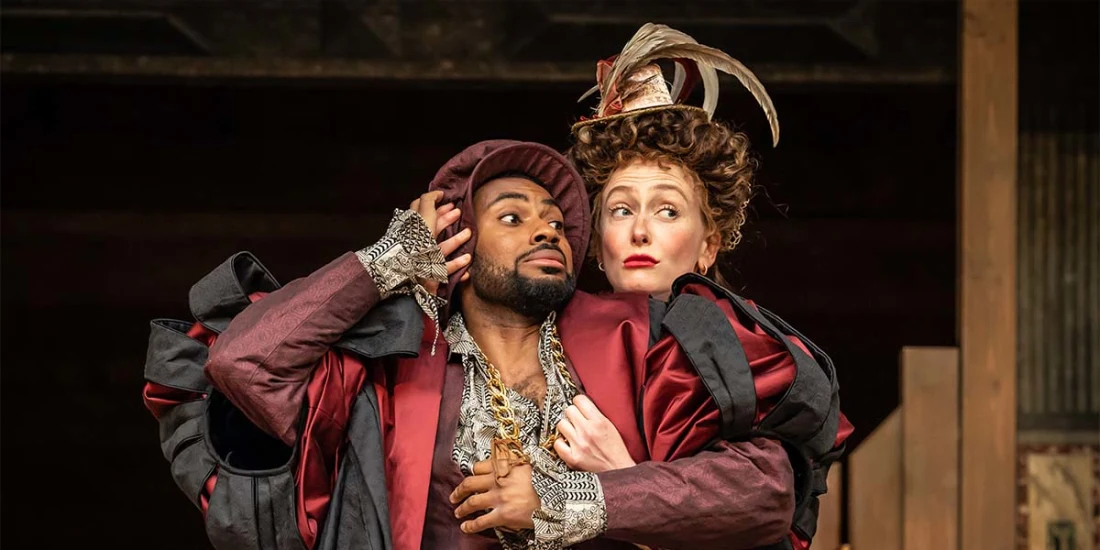'The Comedy of Errors' review — Sean Holmes's production finds emotional depth amid the comedy
Read our four-star review of the classical play The Comedy of Errors, currently in performances in London at Shakespeare's Globe Theatre through 29 July.
For a play with the word “comedy” in its title, The Comedy of Errors can often feel pretty bleak. That point isn’t lost on Sean Holmes, director of Shakespeare's Globe’s smart and savvy new production of the play that spawned the first-ever Shakespeare-themed musical: Rodgers and Hart’s 1938 The Boys from Syracuse.
To be sure, the production is genuinely funny: you leave grinning at a conclusion rife with “wonder,” to co-opt a crucial word that resonates through other reunion-driven narratives from the Bard as well (The Winter’s Tale, for one). But the production pays equal time to the plight of the seemingly doomed Egeon, a Syracusan who has strayed into the enemy territory of Ephesus and is “hopeless and helpless” and risks becoming even “lifeless” as a result.
It’s giving little away to report that things turn out rather better than anticipated for Egeon and others by the time we arrive at a conclusion alive to coincidence and to a commingling of severed families that lifts the heart.
But Holmes’s achievement here is to chart the emotional byways of a text whose characters seem forever to be beating one another up – when, that is, they’re not seeking to be made whole. Antipholus of Syracuse compares himself movingly early on to “a drop of water… that seeks another drop”: this onetime twin, parted in a shipwreck from his lookalike other half, would like nothing more than to find that errant person who will help reconstitute his troubled sense of self.
The above may sound like heavier going than you may expect from so famously larky and knockabout a play, and this early entry in the canon is, I think, often sold thematically short. All credit, therefore, to Holmes, associate artistic director at the Globe, who takes Comedy seriously, which means monitoring its shifts in mood. (A threat is raised at one point of eye-gouging, which anticipates no play so much as King Lear.)
These mean Ephesian streets are quick to violence: a decapitated head rolls into view, and we seem to have stumbled into a banner-waving brawl that looks decidedly ugly. You share Egeon’s unease at his uncertain fate, and it isn’t until we are properly acquainted with the two sets of twins – the masters jointly named Antipholus and their servants, both of whom are called Dromio – that we embark upon the defining whirligig of mistaken identity. Even then, the play, presented straight through at nearly two hours, confronts its mounting absurdities head-on. Philip Cumbus’s Duke may have a gift for the throwaway, putting a spin on language that wouldn’t innately seem funny, but Laura Hanna’s Adriana, wife to Antipholus of Ephesus, is immediately plaintive and engaging: worrying one minute whether she might in fact be “dull” even as she succumbs to fury at the escapades of her adulterous husband. Or is he?
Disorientation rules: Dromio of Ephesus climbs a rope ladder wondering all the while who he is, and reality itself is soon up for grabs. By the time the great Claire Benedict arrives cloaked in authority as the Abbess, you pine for clarity to assert itself amidst the escalating confusion. Where oh where is truth amid all the fake news?
My performance had an ensemble member reading the crucial part of Dromio of Ephesus, who is given the lovely closing lines about exiting the stage “hand in hand, not one before the other.” Normally cast with George Fouracres (a onetime Hamlet at the Sam Wanamaker Theatre), the role was skilfully taken, script in hand, by David Ijiti, who otherwise plays the part of Officer. In firm voice and dressed in street clothes at odds with the period garb elsewhere, Ijiti proved an able, physically supple talent opposite Jordan Metcalfe’s breech-wearing, madcap Dromio of Antipholus.
The antics make delightful use of the yard where a boat suddenly gets carried through some surprised groundlings, one of whom is (cheerfully) called out separately for being bald. Shop signs hang from the upper tiers of the structure, and Paul Wills’s set deploys the height of the space to unusual effect.
A few of the performances (Luciana, Angelo) could be reined in, but the diction – in a now-unamplified auditorium – is generally strong throughout, and the two Antipholi really land. Matthew Broome’s Ephesian twin has an uncanny knack for making Shakespeare sound entirely of the here and now. And Michael Elcock (Hex), as his Syracusan other self, is surpassingly lovely: a lively, quick-witted fellow who experiences more in a few giddy hours than most of us will in a lifetime. “Rejoice,” he commands as a parting shot, and so we do.
Photo credit: Phoebe Naughton and Michael Elcock in The Comedy of Errors at Shakespeare's Globe. (Photo by Marc Brenner)
Originally published on
